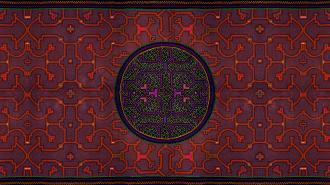A small study out of Yale suggests that the psychedelic drug DMT has some potential as a therapy for major depressive disorder.
DMT is a powerful psychedelic chemical, famed for causing intense experiences of other realities and beings, which is found naturally in many animals and plants (including humans) and is one component of ayahuasca.
While DMT’s hallucinogenic effects are powerful, the trips it induces are much shorter than other psychedelics, like LSD.
The small study suggests that DMT has some potential as a therapy for major depressive disorder.
The exploratory study, published in the Nature journal Neuropsychopharmacology, administered DMT to 10 subjects, seven of whom had been diagnosed with major depressive disorder.
The patients received two escalating doses of DMT “in a typical hospital setting with strategic psychoeducation/support, but minimal psychotherapy,” the researchers wrote — key differences from most psychedelic clinical studies, which use carefully planned, comfortable settings and often bookend the experience with therapy sessions.
Small phase 1 studies like this are designed to study safety and tolerability, first and foremost, and the researchers assessed DMT’s potential for abuse, as well as effects on cardiovascular function, mood, and anxiety of participants.
They also monitored the drug’s psychedelic properties and whether it instills states similar to psychosis, like delusions — known as “psychotomimetic effects.”
Adverse events were mostly mild and expected, the researchers wrote. “DMT increased blood pressure, heart rate, anxiety, psychedelic effects, and psychotomimetic effects, which resolved within 20–30 min of injection.”
There was, however, one serious adverse event, where a subject had a low heart rate and blood pressure without showing symptoms. The volunteer had failed to disclose a history of these symptoms to the researchers, according to Psychedelic Spotlight.
Although not designed at this stage to figure out if DMT is effective against depression, the researchers did assess depression symptoms before and after the treatment, Psychedelic Spotlight reported.
DMT is a powerful psychedelic chemical, famed for causing intense experiences of other realities and beings, which is found naturally in many animals and plants — including humans.
Following the first, lower dose — below the dose needed for a psychedelic trip — average scores on a depression scale, called HAMD-17, did fall but the change wasn’t statistically significant.
After the higher dose, patients’ depression scores fell 4.5 points from baseline — a change that was both statistically significant (meaning, distinguishable from random noise) and large enough to be considered clinically important.
However, we can’t read too much into efficacy findings from small studies like this. In addition to its small sample size and exploratory nature, the phase 1 trial was also “open label” — everyone knew they were taking DMT, and there was no comparison with a placebo or to an alternate treatment.
There were also no long-term follow ups, so even if the rapid fall in depression symptoms was caused by DMT, we don’t know how long it may have lasted.
DMT therapy would have a key advantage over other psychedelics like psilocybin: shorter trips.
Larger trials, with a control group and a longer time frame, will be needed to determine a precise rate of side effects and whether the drug really is effective.
If DMT can be effective at treating depression, it would have a key advantage over other psychedelics like LSD or psilocybin: the short duration of its trips — lasting minutes as opposed to hours — which would mean more practical, possibly less expensive visits, and a more accessible therapy.
It is important to note that this study, while an encouraging first step, is also just that.
“Further rigorous trials are warranted to replicate these findings and to determine the durability of antidepressant effects,” the researchers acknowledge.
We’d love to hear from you! If you have a comment about this article or if you have a tip for a future Freethink story, please email us at tips@freethink.com.
